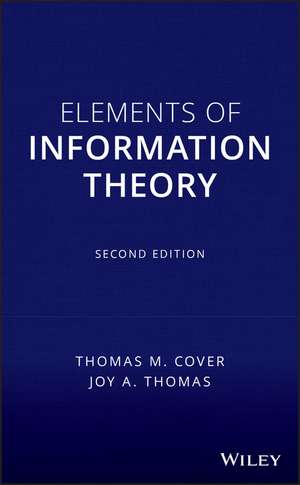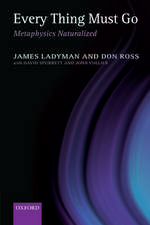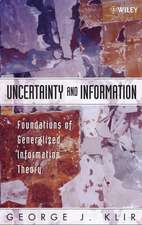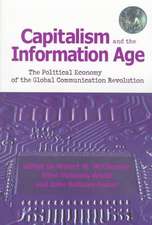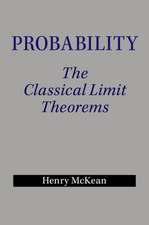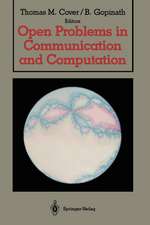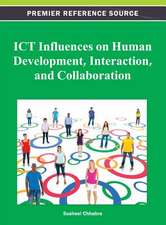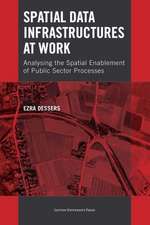Elements of Information Theory 2e
Autor TM Coveren Limba Engleză Hardback – 7 sep 2006
The Second Edition of this fundamental textbook maintains the book′s tradition of clear, thought–provoking instruction. Readers are provided once again with an instructive mix of mathematics, physics, statistics, and information theory.
All the essential topics in information theory are covered in detail, including entropy, data compression, channel capacity, rate distortion, network information theory, and hypothesis testing. The authors provide readers with a solid understanding of the underlying theory and applications. Problem sets and a telegraphic summary at the end of each chapter further assist readers. The historical notes that follow each chapter recap the main points.
The Second Edition features:
∗ Chapters reorganized to improve teaching
∗ 200 new problems
∗ New material on source coding, portfolio theory, and feedback capacity
∗ Updated references
Now current and enhanced, the Second Edition of Elements of Information Theory remains the ideal textbook for upper–level undergraduate and graduate courses in electrical engineering, statistics, and telecommunications. An Instructor′s Manual presenting detailed solutions to all the problems in the book is available from the Wiley editorial department.
Preț: 764.14 lei
Preț vechi: 839.71 lei
-9% Nou
146.24€ • 152.11$ • 120.73£
Carte tipărită la comandă
Livrare economică 14-28 aprilie
Specificații
ISBN-10: 0471241954
Pagini: 784
Dimensiuni: 156 x 234 x 42 mm
Greutate: 1.17 kg
Ediția:2nd Edition
Editura: Wiley
Locul publicării:Hoboken, United States
Public țintă
Senior and graduate level students in Electrical Engineering Researchers and professionals in the telecommunication theory industryDescriere
The latest edition of this classic is updated with new problem sets and material
The Second Edition of this fundamental textbook maintains the book′s tradition of clear, thought–provoking instruction. Readers are provided once again with an instructive mix of mathematics, physics, statistics, and information theory.
All the essential topics in information theory are covered in detail, including entropy, data compression, channel capacity, rate distortion, network information theory, and hypothesis testing. The authors provide readers with a solid understanding of the underlying theory and applications. Problem sets and a telegraphic summary at the end of each chapter further assist readers. The historical notes that follow each chapter recap the main points.
The Second Edition features:
∗ Chapters reorganized to improve teaching
∗ 200 new problems
∗ New material on source coding, portfolio theory, and feedback capacity
∗ Updated references
Now current and enhanced, the Second Edition of Elements of Information Theory remains the ideal textbook for upper–level undergraduate and graduate courses in electrical engineering, statistics, and telecommunications. An Instructor′s Manual presenting detailed solutions to all the problems in the book is available from the Wiley editorial department.
Textul de pe ultima copertă
The latest edition of this classic is updated with new problem sets and material The Second Edition of this fundamental textbook maintains the book′s tradition of clear, thought–provoking instruction. Readers are provided once again with an instructive mix of mathematics, physics, statistics, and information theory.
All the essential topics in information theory are covered in detail, including entropy, data compression, channel capacity, rate distortion, network information theory, and hypothesis testing. The authors provide readers with a solid understanding of the underlying theory and applications. Problem sets and a telegraphic summary at the end of each chapter further assist readers. The historical notes that follow each chapter recap the main points.
The Second Edition features:
- Chapters reorganized to improve teaching
- 200 new problems
- New material on source coding, portfolio theory, and feedback capacity
- Updated references
Now current and enhanced, the Second Edition of Elements of Information Theory remains the ideal textbook for upper–level undergraduate and graduate courses in electrical engineering, statistics, and telecommunications.
Cuprins
Recenzii
"This book is recommended reading, both as a textbook and as a reference." (Computing Reviews.com, December 28, 2006)
Notă biografică
THOMAS M. COVER, PHD, is Professor in the departments of electrical engineering and statistics, Stanford University. A recipient of the 1991 IEEE Claude E. Shannon Award, Dr. Cover is a past president of the IEEE Information Theory Society, a Fellow of the IEEE and the Institute of Mathematical Statistics, and a member of the National Academy of Engineering and the American Academy of Arts and Science. He has authored more than 100 technical papers and is coeditor of Open Problems in Communication and Computation. JOY A. THOMAS, PHD, is the Chief Scientist at Stratify, Inc., a Silicon Valley start–up specializing in organizing unstructured information. After receiving his PhD at Stanford, Dr. Thomas spent more than nine years at the IBM T. J. Watson Research Center in Yorktown Heights, New York. Dr. Thomas is a recipient of the IEEE Charles LeGeyt Fortescue Fellowship.
